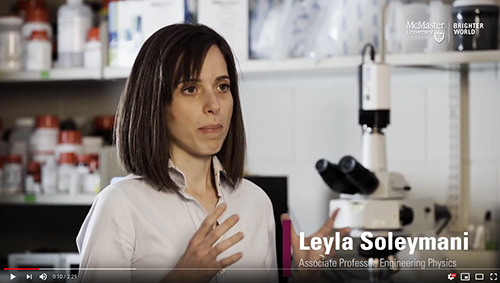Researchers Create Non-stick Coating That Repels External Molecules, Even Viruses and Bacteria; Clinical Laboratories May Soon Find It Easier to Keep Surfaces Free from Bacterial Contamination
Hospital-acquired infections could finally be prevented and no longer threaten the health of patients and hospital workers
In what may be the most significant development in healthcare’s fight against hospital-acquired infections (HAIs), researchers at McMaster University in Hamilton, Ontario, Canada, have developed an ultra-repellent coating that prevents anything—including viruses and bacteria—from adhering to surfaces covered in the material. This fascinating discovery may have great value for both microbiologists and hospital infection control teams, as well as the clinical laboratory and food service industries.
The self-cleaning material has been proven to repel even the deadliest forms of antibiotic resistant (ABR) superbugs and viruses. This ultimate non-stick coating is a chemically treated form of transparent plastic wrap which can be adhered to surfaces prone to gathering germs, such as door handles, railings, and intravenous therapy (IV) stands.
“We developed the wrap to address the major threat that is posed by multi-drug resistant bacteria,” Leyla Soleymani, PhD, Associate Professor at McMaster University and one of the leaders of the study, told CNN. “Given the limited treatment options for these bugs, it is key to reduce their spread from one person to another.”
The researchers tested their revolutionary coating using two potentially deadly forms of antibiotic-resistant bacteria: Methicillin-resistant staphylococcus aureus (MRSA) and Pseudomonas.
In their study, published in ACS Nano, a journal of the American Chemical Society, titled, “Flexible Hierarchical Wraps Repel Drug-Resistant Gram-Negative and Positive Bacteria,” the researchers stated their material was effective at repelling MRSA 87% of the time and at repelling Pseudomonas 84% of the time. The wrapped surfaces also remained free of Escherichia coli (E. coli) after being exposed to the bacteria.
Bacteria-Resistant Wrap Could Greatly Diminish Threat of Hospital-Acquired Infections
This is a significant breakthrough. Dark Daily has covered the growing danger of hospital-acquired infections in numerous e-briefings, including “Could Proximity of Toilets to Sinks in Medical Intensive Care Units Contribute to Hospital-Acquired Infections?” That report covered research by the Medical College of Wisconsin (MCW) which found that sinks located near toilets in patient rooms were four times more likely to have Klebsiella pneumoniae carbapenemase (KPC)-producing organisms in their drains than sinks that were located farther away from toilets.
According to research published in the peer-reviewed Southern Medical Journal, “KPC-producing bacteria are a group of emerging highly drug-resistant Gram-negative bacilli causing infections associated with significant morbidity and mortality.”
Were those surfaces covered in this new bacterial-resistant coating, life-threatening infections in hospital ICUs could be prevented.
Taking Inspiration from Nature
In designing their new anti-microbial wrap, McMaster researchers took their inspiration from natural lotus leaves, which are effectively water-resistant and self-cleaning thanks to microscopic wrinkles that repel external molecules. Substances that come in contact with surfaces covered in the new non-stick coating—such as a water, blood, or germs—simply bounce off. They do not adhere to the material.
The “shrink-wrap” is flexible, durable, and inexpensive to manufacture. And, the researchers hope to locate a commercial partner to develop useful applications for their discovery.
“We’re structurally tuning that plastic,” Soleymani told SciTechDaily. “This material gives us something that can be applied to all kinds of things.”

Industries Outside of Healthcare Also Would Benefit
According to the US Centers for Disease Control and Prevention (CDC), at least 2.8 million people get an antibiotic-resistant infection in the US each year. More than 35,000 people die from these infections, making it one of the biggest health challenges of our time and a threat that needs to be eradicated. This innovative plastic coating could help alleviate these types of infections.
And it’s not just for healthcare. The researchers said the coating could be beneficial to the food industry as well. The plastic surface could help curtail the accidental transfer of bacteria, such as E. coli, Salmonella, and Listeria in food preparation and packaging, according to the published study.
“We can see this technology being used in all kinds of institutional and domestic settings,” Tohid Didar, PhD, Assistant Professor at McMaster University and co-author of the study, told SciTechDaily. “As the world confronts the crisis of anti-microbial resistance, we hope it will become an important part of the anti-bacterial toolbox.”
The research was led by Didar and Soleymani in collaboration with scientists from McMaster’s Institute for Infectious Disease Research (IIDR) and the McMaster-based Canadian Center for Electron Microscopy.
Clinical laboratories also are tasked with preventing the transference of dangerous bacteria to patients and lab personnel. Constant diligence in application of cleaning protocols is key. If this new anti-bacterial shrink wrap becomes widely available, medical laboratory managers and microbiologists will have a new tool to fight bacterial contamination.
—JP Schlingman
Related Information:
Researchers Create Ultimate Non-Stick Coating That Repels Everything—Even Viruses and Bacteria
Flexible Hierarchical Wraps Repel Drug-Resistant Gram-Negative and Positive Bacteria
Scientists Develop Superbug-resistant, Self-cleaning Plastic Wrap
Antibiotic Resistance Threats in the United States
Repel Wraps: Ultimate Non-Stick Coating Repels Everything – Even Viruses and Bacteria



